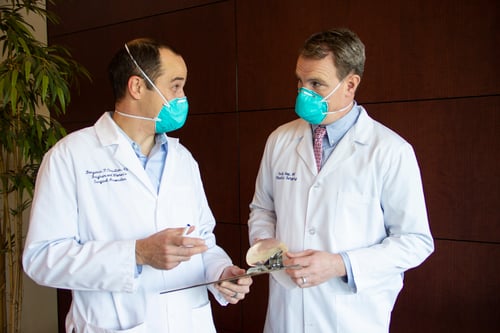 5 Ways Plastic Surgery Helps Cancer Patients in Treatment"
class="bg-img"
fetchpriority="high"
loading="eager"
decoding="async">
5 Ways Plastic Surgery Helps Cancer Patients in Treatment"
class="bg-img"
fetchpriority="high"
loading="eager"
decoding="async">
Written By: Care New England on July 14, 2021
In some circles, there's a false and harmful assumption about plastic surgery: that it's a procedure that exclusively caters to rich and elite socialites hoping to escape the inevitable effects of aging. This assumption could not be more wrong. Plastic surgery is often applied to help those in need of physical reconstruction, whether that be due to an accident or an illness such as cancer.
Though many people are unaware of this fact, plastic surgery is actually a small but vital component in effective treatments for many disorders and diseases.
Even when cancer treatments are successful in slowing or stopping the spread of the disease, they can often leave inevitable, lasting marks on the body. In such cases, plastic surgery is especially helpful.
Plastic surgery represents a small but critical component of the comprehensive care of cancer patients. Its primary role in the treatment of cancer patients is to extend the ability of other surgeons and specialists to more radically treat cancer, offering patients the best opportunity for cure. (NCBI)
 Pictured: Care New England Plastic Surgeons Dr. Benjamin P. Christian and Dr. Erik A. Hoy
Pictured: Care New England Plastic Surgeons Dr. Benjamin P. Christian and Dr. Erik A. Hoy
Cancer treatments, particularly more drastic ones, can change how people look and feel. Plastic surgery can allow patients to seek a new path forward.
Whether the body has been damaged by cancer or by the treatments themselves, reconstructive microsurgeries are small procedures in which surgeons use the patient's own tissues to repair damaged areas. Skin, fat, muscle, and sometimes even small portions of bone are repurposed to reduce scarring and promote healing for cancer patients.
Breast reconstruction is one of the most common and well-known surgeries connected to cancer treatments. Though this is not the road every woman who's had a cancer-related mastectomy chooses, it's a discussion women with breast cancer generally have with their doctors and surgeons before they undergo surgery to remove a tumor and/or breast.
When cancers such as soft tissue sarcomas are removed, doctors remove not just the tumor itself but a "cuff" of normal tissue. This minimizes the risk of the tumor recurring at the local resection site.
While these margins are intended to ensure the ongoing health and wellbeing of the patient, they do leave unnatural deficits in the soft tissue. Fortunately, these can be addressed through plastic surgery.
As with soft tissue sarcomas, removal of certain skin cancers involves removing not just the skin cancer but also surrounding margins. At times, this can lead to wide resections of skin. In such cases, plastic surgeons can reposition healthy tissue from another part of the body over the wound to minimize scarring.
Radiation therapy may prove effective in treating cancer, but it does come with some fairly significant side effects.
Common overall side effects of radiation therapy can include:
In addition to these general complaints, because radiation treatments are localized, the specific parts of the body targeted for treatment will experience harmful side effects as well. Those side effects include damage to healthy tissue.
In such an event, plastic surgery can prove helpful in restoring the appearance and/or increase the function of the damaged area.
If you have identified areas of concern in your health, or if you have further questions about plastic surgery and cancer, Care New England is here to help.
Disclaimer: The content in this blog is for informational and educational purposes only and should not serve as medical advice, consultation, or diagnosis. If you have a medical concern, please consult your healthcare provider or seek immediate medical treatment.
Copyright © 2026 Care New England Health System